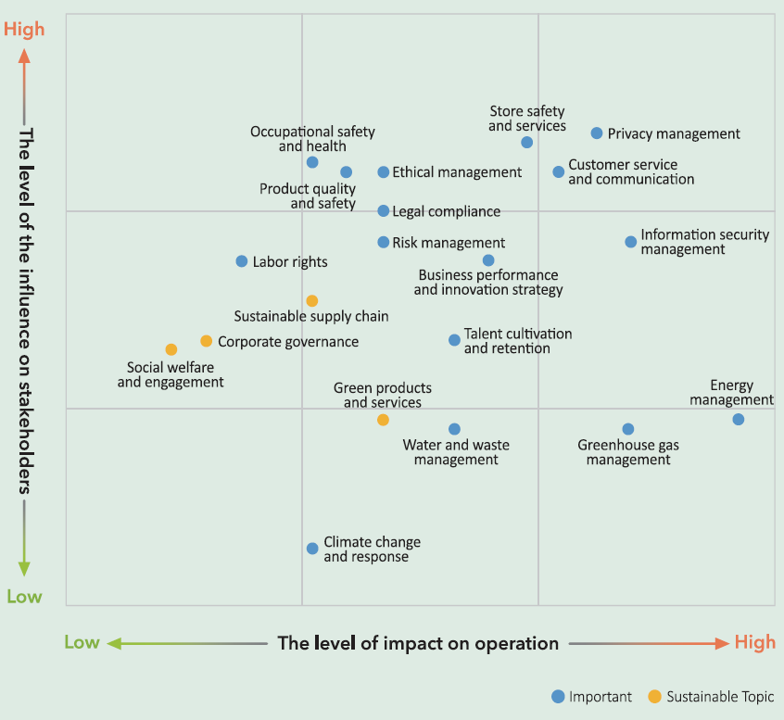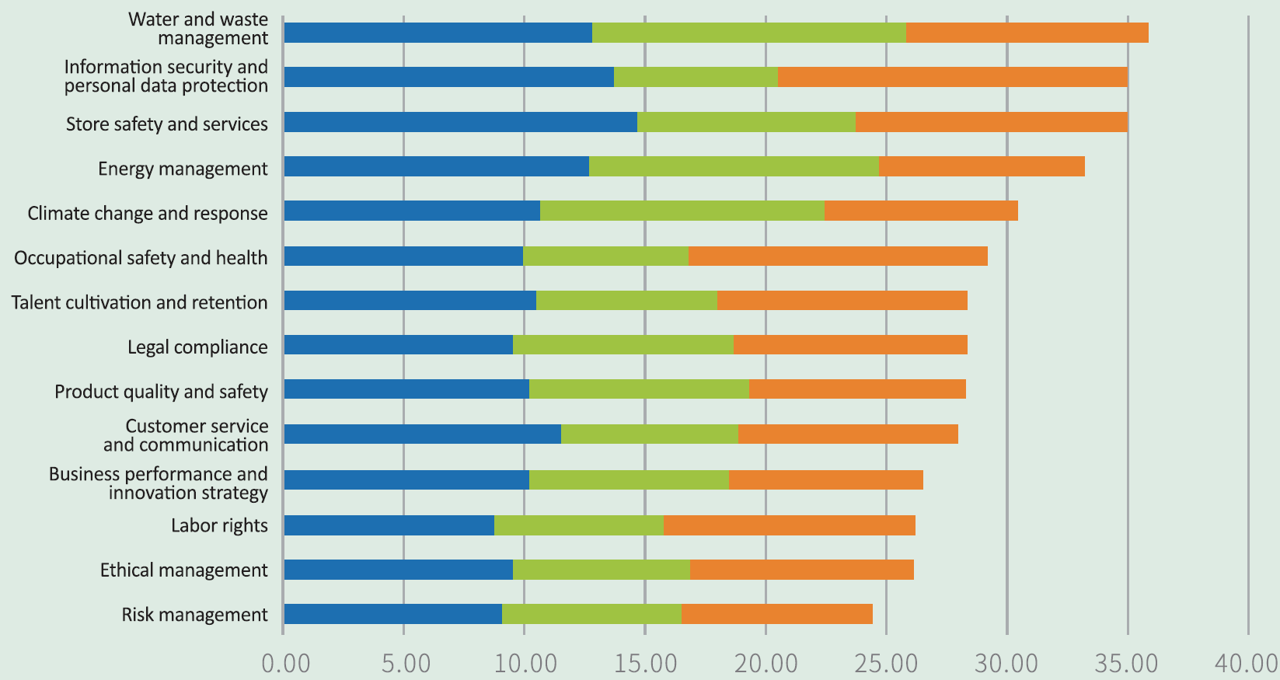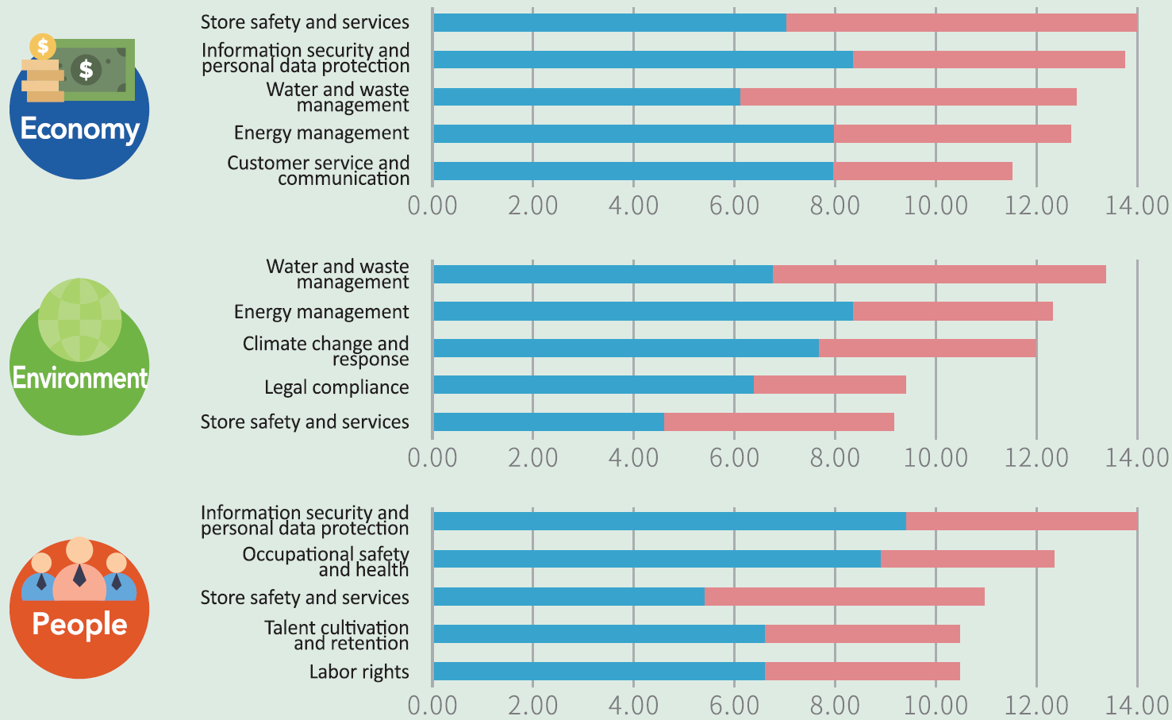Identification of Material Topics
Analysis of Material Topics
FEDS refers to the AA1000 principle of accountability, GRI sustainability guidelines, domestic and international sustainable development trends and standards, as well as domestic industry and stakeholder concerns, as the basis for evaluation of material topics and disclosure of the report. FEDS conducts regular inspections of material topics every year, examines the impact of each topic and use the identification results as a reference for sustainable management actions and improving the quality of sustainable decision-making.
Identify Topics
Based on the AA1000 SES stakeholder engagement principles of dependency, responsibility, influence, diversity perspectives, and tension, the Corporate Sustainability Committee identifies 6 major categories of stakeholders: consumers, employees, business partners (consignment counters, suppliers), shareholders (investors), government, and society (media, community).
Based on sustainable norms and standards, changes in the industrial environment, Company’s development goals, and issues of concern by stakeholders, 29 sustainable issues were collected. After discussion by the Executive Office of the Enterprise Sustainability Committee and consideration of relevant sustainability risks, they were adjusted to 20 sustainability issues, including 5 environmental issues, 8 social issues, and 7 governance issues. A questionnaire survey was conducted.
Using 1,002 questionnaires from last year’s stakeholders, the survey investigated the level of attention to sustainability issues among six types of stakeholders, including consumers (316), employees (246), business partners (205), shareholders/investors (43), government (30), and society (162). In addition, the impact level of sustainability issue on the Company’s operations was evaluated based on the 20 questionnaires for the Corporate Sustainability Committee.
An “Impact Assessment Questionnaire” was delivered to 13 members of the Corporate Sustainability Committee to rate the positive and negative impacts on the external economy, environment, and people (including human rights) for each material topic. The impact assessment will consider both the probability of occurrence and the impact level and breadth, and submit it to the Corporate Sustainability Committee for approval.
The Corporate Sustainability Committee confirms and finalizes the information on the material topics, and continues to pay attention to the positive and negative impacts of material topics and the expectations of stakeholders for FEDS, which will be used as a reference for the appropriateness of material topics for the next year. In addition, it ensures that sustainable information and performance are fully expressed.

Material Topic Matrix

Impact Assessment
FEDS adopts the principle of double materiality, identifies 14 material topics, and through comprehensive analysis, determines the ranking of the impact level of material topics and the ranking of the top 5 impact level in each aspect. Among them, “Water and Waste Management” and “Store Safety and Services” have identified negative impacts as greater than positive impacts FEDS will particularly strengthen management actions to reduce negative impacts on operational activities.
Impact Assessment Results of Material Topics

Top 5 in Terms of Economic,
Environmental and Human Rights Impacts

經濟、環境、人權衝擊排序前5名
經濟

環境
人權
Impact Description and Management
| Material topics | Impact description and management |
| Water and waste management | Green operation is the environmental management goal of FEDS. Garbage, kitchen waste, and waste cooking oil are listed as the focus of waste management in the department stores. All waste disposal is in compliance with environmental protection laws and regulations. At the same time, resource recycling is strengthened to reduce the negative environmental impact of department store operations. In addition, in order to reduce the impact of its own operations on local water resources, FEDS promotes water-saving management and improves water resource performance. |
| Information security management | FEDS has an Information Security Officer to comprehensively strengthen corporate information security in terms of technology, procedures, operations, legal compliance, and risk control, and has established an information security early warning and notification mechanism to reduce corporate information security risks. Regarding the protection of employee and customer personal data, FEDS reviews the use and preservation of personal data to ensure that personal data is properly protected and managed in compliance with the Personal Data Protection Act. FEDS had no personal data leakage incident in 2023, which resulted in a positive impact on the economy and human rights. |
| Store safety and services | Starting from sustainability, FEDS aims to create a “safe, convenient, healthy, and environmentally friendly” shopping environment. Through careful planning of store facilities, traffic flow arrangements, and service design, FEDS provides friendly services for consumers of all age groups. FEDS also regularly promotes personnel safety education and training to protect shopping safety in the stores and reduce negative impacts on the environment. |
| Energy management | FEDS has an “Energy Management Policy” to promote energy-saving projects. With the growth of turnover, it gradually reduces its dependence on energy. In the past 7 years, the electricity consumption per NT$1 of turnover has been reduced by 17%. At the same time, in line with the government’s energy transition policy, the “Green Power Plan” was launched, and solar photovoltaic equipment was installed in the east of Taiwan. After completion, it is expected to produce 1.94 million kWh of green electricity per year, increasing the use of green energy and bringing positive impact on economy and environment. |
| Climate change and response | Establishment of a climate risk-related assessment and management mechanism drives FEDS’s development of towards low-carbon sustainability and environmental friendliness. It will enhance FEDS’s toughness, effectively reduce the impact of climate change issues on the operating costs, asset values and operating risks of FEDS, and have a positive impact on the economy and the environment. |
| Occupational safety and health | A safe workplace environment has a positive impact on the economy and human rights. FEDS has promoted employee health promotion plan for 5 consecutive years to create a healthy workplace environment. Meanwhile, Occupational Safety and Health Committee is set up to promote workplace safety and health projects, and regularly evaluates, reviews, inspects and improves the procedures to reduce the possible negative impact of unsafe workplace. |
| Talent cultivation and retention | FEDS promotes industry-academia cooperation, makes good use of its resources, cultivates talents for the industry, and designs a complete talent training blueprint and job rotation mechanism to cultivate talents for the Company’s development. FEDS also attracts external talents to join and retain outstanding talents within the organization through a generous and diverse salary and benefit system, allowing the Company to develop stably. |
| Legal compliance | FEDS draws up the direction of corporate regulations to comply from the three aspects of “establishing systems, implementing management, and educating employees”. For the details of operations processes, such as procedure, products and services, FEDS has formulated management measure to strictly abide. It can reduce the risk and responsibility of violating laws and regulations, and avoid unnecessary financial losses and goodwill impairment. |
| Product quality and safety | FEDS manages the products for sale in accordance with laws and regulations, binds the consignment counters to comply with government regulations in the counter contracts, and formulates clear management measure to implement independent management. FEDS continuously enhances the quality and safety of the products through regular inventory checks, random inspection and verification to reduce the negative impact on the economy, environment and human rights. |
| Customer service and communication | FEDS has introduced a good service process to maintain good customer service quality. The Company has set up multiple communication channels to listen carefully to customers’ suggestions and feedback. In addition, FEDS has established operating regulations such as “On-site Customer Opinion Handling Measures” to ensure that customers’ opinions can be addressed in a timely manner to improve the satisfaction with the Company, so as to maintain the long-term trust relationship with customers, form a positive cycle, and indirectly contribute to the economic growth. |
| Business performance and innovation | Innovation and transformation with the times is an important foundation for the sustainable operation of FEDS. There are four major operating types in the retail business of FEDS, including department stores, shopping malls, hypermarkets, and high-end supermarkets, which meet the needs of the people in all aspects of life. The revenue and profit of FEDS in 2023 both reached record highs, which had a positive impact on the economy. In addition, FEDS has adopted 100% green buildings since its fourth-generation store, a pioneer in the development of department stores. It operates in an environmentally friendly and green manner to reduce the negative impact on the environment. |
| Labor rights | In compliance with the human rights spirit and basic principles guaranteed by international human rights conventions, FEDS actively establishes a positive and harmonious labor-employment relationship and working environment, eliminates any form of discrimination, and creates a sustainable and inclusive workplace. In terms of supplier management, FEDS requires suppliers to make human rights commitments together with FEDS through the counter contract and the supplier’s Corporate Social Responsibility Commitment Letter. Suppliers who violate human rights laws and regulations will lead to the termination of the business relationship. |
| Ethical management | FEDS attaches great importance to ethical management. Except for arranging various ethical management education and training, and requiring supervisors to evaluate the ethical behavior of subordinates at any time, FEDS formulates various ethical management guidelines as the code of conduct for all employees to follow. Meanwhile, the early warning mechanism is implemented in the annual internal control self-assessment, which requires each unit to evaluate whether its business conduct meets the standards of integrity and ethical value required by the Company. It mitigates the corruption risk and has a positive impact on all kinds of business activities in the economy. |
| Risk management | Based on the root cause of “systemic risk” and “non-systemic risk”, FEDS’s responsible unit or cross-departmental functional organization conducts comprehensive risk management and response to ensure that all businesses are implemented under a sound risk management system so as to reduce the impact on the economy, environment and society. |
